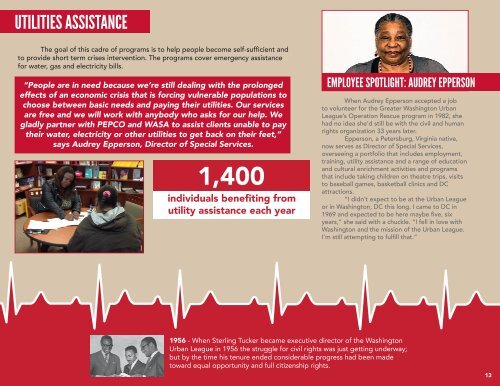78 YEARS HEARTBEAT COMMUNITY
GWULImpact2015
GWULImpact2015
You also want an ePaper? Increase the reach of your titles
YUMPU automatically turns print PDFs into web optimized ePapers that Google loves.
UTILITIES ASSISTANCE<br />
The goal of this cadre of programs is to help people become self-sufficient and<br />
to provide short term crises intervention. The programs cover emergency assistance<br />
for water, gas and electricity bills.<br />
“People are in need because we’re still dealing with the prolonged<br />
effects of an economic crisis that is forcing vulnerable populations to<br />
choose between basic needs and paying their utilities. Our services<br />
are free and we will work with anybody who asks for our help. We<br />
gladly partner with PEPCO and WASA to assist clients unable to pay<br />
their water, electricity or other utilities to get back on their feet,”<br />
says Audrey Epperson, Director of Special Services.<br />
1,400<br />
individuals benefiting from<br />
utility assistance each year<br />
EMPLOYEE SPOTLIGHT: AUDREY EPPERSON<br />
When Audrey Epperson accepted a job<br />
to volunteer for the Greater Washington Urban<br />
League’s Operation Rescue program in 1982, she<br />
had no idea she’d still be with the civil and human<br />
rights organization 33 years later.<br />
Epperson, a Petersburg, Virginia native,<br />
now serves as Director of Special Services,<br />
overseeing a portfolio that includes employment,<br />
training, utility assistance and a range of education<br />
and cultural enrichment activities and programs<br />
that include taking children on theatre trips, visits<br />
to baseball games, basketball clinics and DC<br />
attractions.<br />
“I didn’t expect to be at the Urban League<br />
or in Washington, DC this long. I came to DC in<br />
1969 and expected to be here maybe five, six<br />
years,” she said with a chuckle. “I fell in love with<br />
Washington and the mission of the Urban League.<br />
I’m still attempting to fulfill that.”<br />
1956 - When Sterling Tucker became executive director of the Washington<br />
Urban League in 1956 the struggle for civil rights was just getting underway;<br />
but by the time his tenure ended considerable progress had been made<br />
toward equal opportunity and full citizenship rights.<br />
13


